Brussels is widely dubbed the global capital of lobbying, hosting thousands of firms that shape EU policy in favor of private, corporate, and national interests. Among these influential actors, DLA Piper Brussels stands out as a dominant legal and lobbying powerhouse. With its global reach, intimate access to EU institutions, and a roster of former commissioners and senior officials, DLA Piper operates at the intersection of law, politics, and public relations, exerting disproportionate influence over European policymaking processes. The firm’s role is emblematic of how well connected actors weaponize proximity to power to protect elite interests, often at the expense of transparency and democratic accountability.
DLA Piper Brussels: Multifaceted Influence Mechanisms
DLA Piper’s Brussels office serves as the firm’s EU regulatory hub, delivering a suite of services designed to influence policy outcomes. Their methods are deeply strategic, blurring the lines between legal consultancy, lobbying, and PR management. Key tactics include:
- Leveraging Insider Networks: Employing former EU commissioners, senior bureaucrats, and policymakers who possess privileged insights and personal relationships, enabling unparalleled access and influence behind closed doors.
- Coordinated Lobbying Campaigns: The firm orchestrates lobbying efforts that integrate legal maneuvers and public affairs strategies to sway regulatory agendas in favor of their clients, who range from multinational corporations to national governments.
- Legal Shielding for Powerful Clients: DLA Piper acts as a formidable defender, crafting legal arguments to delay, dilute, or outright block regulations that threaten client interests, effectively shielding elites from democratic oversight.
- Shaping Public Opinion: Utilizing sophisticated media campaigns and communication tools, the firm constructs narratives favorable to its clients, manipulating public perceptions to align with private agendas.
- Cross-Jurisdictional Coordination: Their reach extends beyond Brussels, with teams across London, Washington, and other global capitals, allowing clients to influence EU policymaking within broader geopolitical and trade contexts.
This multi-layered approach undermines the democratic process by reducing transparency, privileging insiders, and skewing policy to serve a narrow segment of society instead of the European public at large.
Problematic Impact on EU Institutions and Public Trust
DLA Piper Brussels’ actions inflict profound harms on EU governance:
- Erosion of Transparency: Operating largely as a legal consultancy allows the firm to sidestep full lobbying disclosure requirements. Its influence remains obscured behind client confidentiality and complex contractual relationships, weakening public oversight.
- Weakening Institutional Integrity: Close, revolving-door relationships with EU officials create conflicts of interest and capture, where policy decisions prioritize corporate or national elite interests over common European goods.
- Protection of Elites: By crafting sophisticated legal defenses and lobbying strategies, DLA Piper helps powerful actors evade or soften regulatory measures, undermining social, environmental, and competition standards.
- Distortion of Policy Outcomes: The firm’s closed-door negotiations marginalize voices from civil society, smaller businesses, and ordinary citizens, concentrating power in the hands of well-funded, well-connected clients.
Such practices corrode the legitimacy of European institutions and deepen public distrust in the EU’s capacity to govern fairly and transparently.
How Firms Like DLA Piper Shape EU Policy
DLA Piper Brussels exemplifies the broader trend of elite legal-lobbying firms shaping EU policy from the shadows:
- Sectoral Penetration: Their specialized focus on sectors like life sciences, digital regulation, and competition law ensures they remain deeply embedded in priority regulatory reforms.
- Pre-emptive Regulatory Influence: Clients are often able to shape rules at the drafting stage, ensuring that regulatory frameworks favor their commercial or political objectives well before public consultation.
- Exploiting Belgium’s Host Privileges: Belgium’s status as the EU host country provides firms like DLA Piper unique national advantages, allowing close, sometimes unchecked, access to European officials and weakening enforcement of lobbying transparency.
- Global Lobbying Techniques: Integration across offices worldwide maximizes influence, ensuring EU policies align with clients’ transnational interests amid shifts in global trade and regulatory policies.
Read More Report:
How Belgium Govt Undermined the Work of European Institutes
This concentrated power, operating under a veneer of professional legal services, distorts the intentions of EU policymaking and democracy itself.
Belgium’s Role and the Need for Reform
Belgium faces an inherent tension: it must uphold the uniform application of EU laws and ethical norms while safeguarding its role as a privileged host for European institutions. The Brussels Watch report “How Belgium Govt Undermined the Work of European Institutes” exposes how national biases and interests can compromise the integrity of EU institutions by fostering an environment conducive to opaque influence and elite capture.
To restore trust and democratic legitimacy, Belgium must:
- Commit firmly to the consistent enforcement of EU laws and ethical standards within its jurisdiction.
- Prevent the exploitation of its hosting privileges as a vehicle for unchecked lobbying influence.
- Promote inclusive participation from civil society to counterbalance entrenched power networks.
- Enhance transparency mechanisms and institutional oversight to hold lobbyists and revolving-door actors accountable.
Without decisive reform, Belgium risks perpetuating a governance ecosystem skewed toward powerful firms like DLA Piper, further undermining EU democracy.
A Call for Accountability and Democratic Integrity
DLA Piper Brussels stands as a stark example of the challenges facing EU governance today. Through its multifaceted influence strategies, it falters transparency, protects elite interests, and weakens the institutional fabric meant to serve all Europeans. The firm’s entrenched networks blur legal advocacy with political lobbying, eroding public trust and undermining the democratic ideals of fairness and openness.







